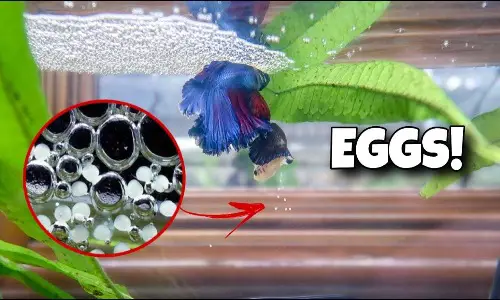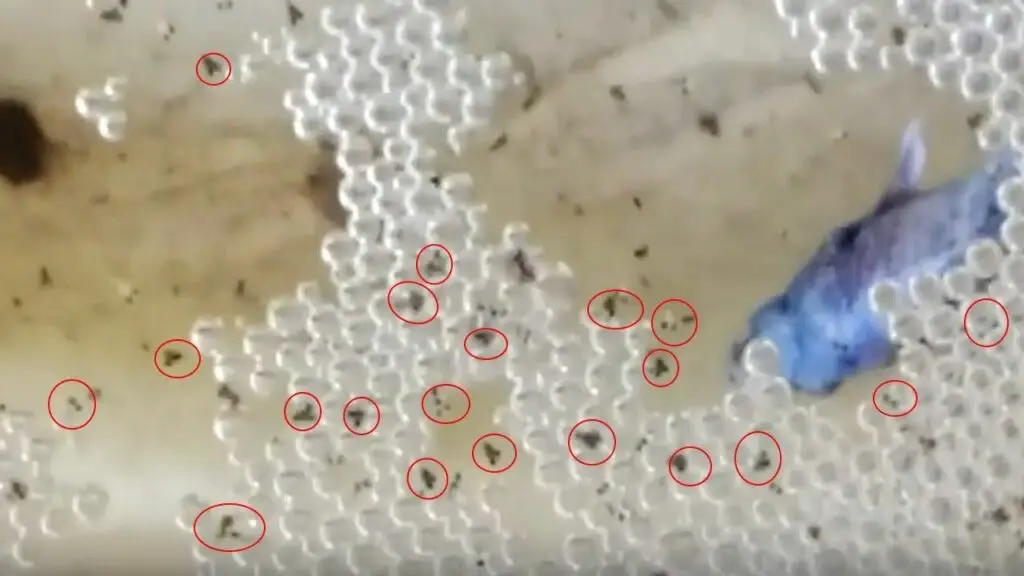Last Updated on 10 months by admin
Betta fish are known for their unique appearance and vibrant colors, making them a popular choice for aquarium enthusiasts. But did you know that these fish also have a fascinating breeding process? One of the most intriguing aspects of betta fish breeding is the hatching of their eggs. In this article, we will delve into everything you need to know about betta fish hatching eggs, from the breeding process to caring for the fry. So, let’s dive in and explore this exciting world of betta fish breeding!
All About Betta Fish Hatching Eggs: Betta fish hatching eggs can be a rewarding experience for aquarium enthusiasts. Before attempting it, ensure the water temperature is between 78-80°F and the pH level is 7.0. Females can lay up to 100 eggs, which will hatch within 24-36 hours. It’s important to remove the male from the tank once the eggs are laid to prevent him from eating them. The fry can be fed infusoria or newly hatched brine shrimp. Proper care and attention will ensure a successful betta fish hatching experience.

All About Betta Fish Hatching Eggs
Betta fish, also known as Siamese fighting fish, are one of the most popular aquarium fish due to their vibrant colors and unique personalities. Breeding betta fish is a popular hobby among aquarists, and hatching betta fish eggs is an essential part of the breeding process. In this article, we will explore everything you need to know about betta fish hatching eggs.
Understanding Betta Fish Reproduction
Betta fish are egg layers, meaning that they reproduce by laying eggs rather than giving birth to live young. Breeding betta fish requires a male and female pair, and the female will lay her eggs on a surface, such as a leaf or a bubble nest created by the male. The male will then fertilize the eggs, and they will begin to hatch within a few days.
To successfully hatch betta fish eggs, you will need to provide the right conditions and care for the eggs and the fry (baby fish) once they hatch.
Preparing for Betta Fish Hatching Eggs
Before breeding betta fish, you will need to prepare a breeding tank. This should be a separate tank from your main aquarium, as the breeding process can be stressful for the fish and may require different conditions. The breeding tank should be at least five gallons and filled with clean, treated water.
You will also need to provide hiding places for the fish, such as plants or caves, as well as a heater to maintain a consistent temperature. The water temperature should be around 78-82°F, and the pH level should be between 6.5-7.5.
Encouraging Betta Fish to Breed
Once your breeding tank is set up, you can introduce your male and female betta fish. The male will begin to build a bubble nest at the surface of the water, and the female will lay her eggs on the nest. The male will then fertilize the eggs and collect them in the bubble nest.
After breeding, you should remove the female from the tank to prevent her from eating the eggs or attacking the male. The male will continue to care for the eggs and the fry once they hatch.
Caring for Betta Fish Eggs
Betta fish eggs will hatch within 48-72 hours after fertilization. During this time, it is important to keep the water temperature and pH level consistent. You should also provide a gentle filter to keep the water clean and oxygenated.
Once the eggs hatch, the fry will remain in the bubble nest for several days until they become free-swimming. At this point, you can begin to feed them small amounts of infusoria or baby brine shrimp.
Betta Fish Hatching Eggs Benefits
Breeding betta fish and hatching their eggs can be a rewarding experience for aquarists. It allows you to observe the fascinating process of fish reproduction and can result in a new generation of beautiful and healthy betta fish.
In addition, breeding betta fish can help to preserve and improve the genetic diversity of the species, as well as create new and unique color variations.
Betta Fish Hatching Eggs Vs Buying Fry
While it is possible to buy betta fish fry from pet stores or breeders, hatching your own eggs can be a more cost-effective and rewarding option. It allows you to have full control over the breeding process and ensure the health and quality of the fry.
In addition, buying fry can come with risks such as disease or genetic defects. Breeding your own betta fish and hatching their eggs can help to avoid these risks and create a stronger and healthier fish population.
Conclusion
Hatching betta fish eggs can be a fascinating and rewarding experience for aquarists. By understanding the betta fish breeding process and providing the right conditions and care, you can successfully hatch healthy and vibrant fry.
Whether you are a beginner or an experienced aquarist, breeding betta fish and hatching their eggs can be a fun and fulfilling hobby.
Freequently Asked Questions
Betta fish hatching eggs is an interesting and exciting process for fish enthusiasts. However, it requires knowledge and care to ensure the survival of the fry. Here are some commonly asked questions and answers about betta fish hatching eggs.
What is the process of betta fish hatching eggs?
The process of betta fish hatching eggs begins with the breeding of male and female betta fish in a breeding tank. After spawning, the male betta fish collects the eggs in his mouth and places them in the bubble nest. The eggs will hatch in 24-48 hours, and the fry will be released from the nest after 2-3 days.
It is important to monitor the water temperature, pH level, and water quality during this process to ensure the survival of the fry. The fry will need to be fed small amounts of food multiple times a day, and the water will need to be changed frequently to maintain optimal conditions.
What should I feed the fry after they hatch?
The fry will need to be fed small amounts of food multiple times a day. You can feed them baby brine shrimp, microworms, or commercial fry food. It is important to feed them small amounts at a time to avoid overfeeding, which can lead to poor water quality and health problems for the fry.
As the fry grow, you can gradually increase the amount and frequency of their feedings. It is important to monitor their growth and adjust their feeding schedule accordingly.
How many eggs can a female betta fish lay?
A female betta fish can lay between 10-50 eggs per spawning. However, the number of eggs can vary depending on the age, size, and health of the female betta fish.
It is important to provide the female betta fish with optimal conditions and nutrition before breeding to ensure the health and viability of the eggs.
What should I do if the male betta fish eats the eggs?
If the male betta fish eats the eggs, it could be due to stress, lack of experience, or poor conditions in the breeding tank. It is important to provide the male betta fish with a suitable environment and monitor its behavior during the breeding process.
If the male betta fish continues to eat the eggs, you may need to separate it from the breeding tank and try again with a different male betta fish or breeding pair.
When can I separate the fry from the breeding tank?
You can separate the fry from the breeding tank after they have been released from the bubble nest and are free-swimming. This usually occurs after 2-3 days. It is important to provide the fry with a suitable environment and monitor their growth and behavior.
You can gradually increase the size of their tank and adjust their feeding schedule as they grow. It is also important to maintain optimal water quality and conditions to ensure their health and survival.

Betta Fish Eggs Hatching (From 0 to 7 Days)
In conclusion, betta fish hatching eggs can be a fascinating and rewarding experience for any fish enthusiast. With the right preparation and care, it is possible to successfully hatch and raise betta fish fry. However, it is important to keep in mind that raising betta fish fry requires a lot of attention and effort, so it is not a task for the faint of heart.
Despite the challenges, many people find the experience of raising betta fish fry to be incredibly rewarding. Watching the tiny fry grow and develop into beautiful adult fish is truly a special experience that few get to witness. And for those who are interested in breeding and raising fish, betta fish hatching eggs can be a great place to start.
Overall, if you are up for the challenge and willing to put in the effort, betta fish hatching eggs can be a wonderful and fascinating experience. With the right care and attention, you can successfully hatch and raise healthy betta fish fry, and enjoy all the rewards that come with it.
